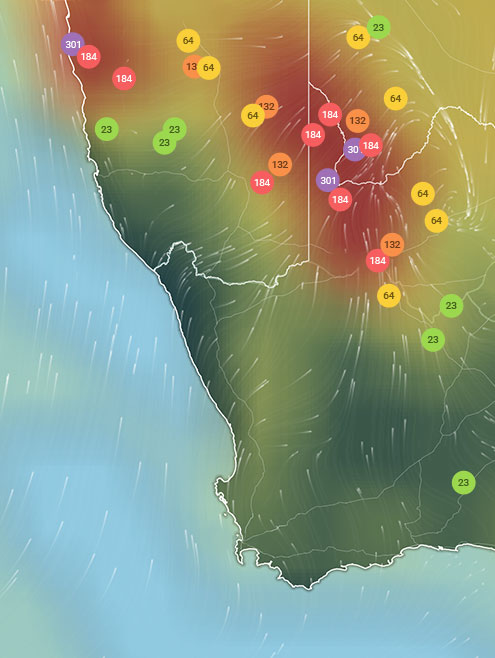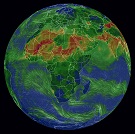Get a monitor and contributor to air quality data in your city.
100.6K people follow this city






AIR QUALITY DATA CONTRIBUTORS
Find out more about contributors and data sources| Weather | Broken clouds |
| Temperature | 84.2°F |
| Humidity | 37% |
| Wind | 17.3 mp/h |
| Pressure | 29.6 Hg |
| # | city | US AQI |
|---|---|---|
| 1 | Kayseri, Kayseri | 127 |
| 2 | Sultangazi, Istanbul | 116 |
| 3 | Istanbul, Istanbul | 111 |
| 4 | Kahramanmaras, Kahramanmaras | 110 |
| 5 | Samsun, Samsun | 105 |
| 6 | Cankaya, Ankara | 99 |
| 7 | Adana, Adana | 93 |
| 8 | Bursa, Bursa | 89 |
| 9 | Izmit, Kocaeli | 88 |
| 10 | Karabuk, Karabuk | 88 |
(local time)
SEE WORLD AQI RANKING
| # | station | US AQI |
|---|---|---|
| 1 | Antalya - Traffic | 78 |
(local time)
SEE WORLD AQI RANKINGUS AQI
74
live AQI index
Moderate
| Air pollution level | Air quality index | Main pollutant |
|---|---|---|
| Moderate | 74 US AQI | PM2.5 |
| Pollutants | Concentration | |
|---|---|---|
| PM2.5 | 22.9µg/m³ | |
| PM10 | 67.8µg/m³ | |
| O3 | 0µg/m³ | |
| NO2 | 0µg/m³ | |
| SO2 | 0µg/m³ | |
| CO | 0µg/m³ | |
PM2.5
x4.6
PM2.5 concentration in Antalya is currently 4.6 times the WHO annual air quality guideline value
| Sensitive groups should reduce outdoor exercise | |
| Close your windows to avoid dirty outdoor air GET A MONITOR | |
| Sensitive groups should wear a mask outdoors GET A MASK | |
| Sensitive groups should run an air purifier GET AN AIR PURIFIER |
| Day | Pollution level | Weather | Temperature | Wind |
|---|---|---|---|---|
| Monday, Apr 22 | Good 44 AQI US | 71.6° 60.8° | ||
| Tuesday, Apr 23 | Moderate 57 AQI US | 77° 64.4° | ||
| Wednesday, Apr 24 | Moderate 65 AQI US | 80.6° 68° | ||
| Today | Moderate 74 AQI US | 84.2° 69.8° | ||
| Friday, Apr 26 | Moderate 52 AQI US | 77° 66.2° | ||
| Saturday, Apr 27 | Good 41 AQI US | 77° 64.4° | ||
| Sunday, Apr 28 | Good 44 AQI US | 78.8° 64.4° | ||
| Monday, Apr 29 | Moderate 53 AQI US | 78.8° 66.2° | ||
| Tuesday, Apr 30 | Moderate 77 AQI US | 77° 68° | ||
| Wednesday, May 1 | Moderate 76 AQI US | 75.2° 68° |
Interested in hourly forecast? Get the app
Antalya is the fifth-most populous city in Turkey and the capital of Antalya Province. It is bordered by the Taurus mountains and is located on the south west coast on the Aegean Sea. According to a census conducted in 2019, Antalya had an estimated population of approximately 1.3 million people in the urban area and 2.5 million in the entire metropolitan area. This ranks it as the fifth most populous city in Turkey.
Towards the end of 2021, Antalya was experiencing a period of “Moderate” air quality with a US AQI reading of 55. This United States Air Quality Index number is calculated using the levels of six of the most commonly occurring air pollutants, such as nitrogen dioxide, sulphur dioxide, ozone, carbon monoxide and both sizes of particulate matter, which are PM2.5 and PM10. It can then be used as the metric when comparing air quality in other cities around the world. If data is unavailable for all 6 pollutants, a figure can still be calculated by using what figures there are. There were four pollutants measured in Antalya which were; PM2.5 - 14.2 µg/m³, PM10 - 32.4 µg/m³, ozone (O3) - 53.7 µg/m³ and carbon monoxide (CO) - 37.8 µg/m³.
This level of PM2.5 is just below one and a half times above the recommended safe level of 10 µg/m³ as suggested by the World Health Organisation (WHO) as being an acceptable level. Although no amount of air pollution is considered to be safe.
When the level of air pollution is classed as being “Moderate” the offered advice would be to remain indoors as much as possible and close all doors and windows to prevent the ingress of more polluted air. Those who are sensitive to poor quality air should take extra care when venturing outdoors. If this cannot be avoided, then a good quality face mask should be worn as extra protection.
For up-to-date information about air quality, there is an app available from AirVisual which is downloadable for all mobile devices. This will give you the air quality in real-time.
Air quality can be affected by many variables and therefore can change very quickly depending on meteorological and atmospheric changes.
Looking back at the figures for 2020, published by IQAir.com, it can be seen that the entire year returned figures from the “Moderate” category with figures between 12.1 and 35.4 µg/m³. The cleanest month for air quality was June with a reading of 14.5 µg/m³, the worst was December with a 31.2 µg/m³ reading.
There were no records kept regarding air pollution before 2020 when the reading was noted as being 18.4 µg/m³. However, this reading may have been affected by the COVID-19 pandemic as many vehicles were no longer in daily use because the offices were closed, in an attempt to halt the spread of the virus. Many factories and non-essential production units were also required to close which removed their emissions from the atmosphere, albeit it on a temporary basis.
Air pollution in Antalya has reached the 'sensitive' level due to the burning of poor quality coal and plastic-like materials. Although the use of natural gas has increased in recent years, the use of coal is widespread in some areas in the city centre. In addition, the use of coal in agriculture continues. Coal used in greenhouses has a great contribution to air pollution. Greenhouses with a production area of thousands of acres. It is one of the most important pollutants with its high fuel consumption. Especially in the city centre, in the Aksu region, there are dense greenhouses and the use of fuel against the danger of frost peaks in winter.
Failing to clean and maintain the chimney before winter, not using the heating boiler properly and burning the heating boilers by unqualified persons, burning plastic bags, rubber and coal bags in heaters and stoves. Factors are also one of the important causes of air pollution.
With the Covid-19 epidemic, it is seen that the pollution caused by traffic temporarily decreases in the city centres, and the pollution caused by heating decreases seasonally, as it does every year. However, this situation is temporary. It can be seen that the air quality is getting worse every year and polluted air has been inhaled in all cities for five years in a row.
Both European and Turkish atmospheres have higher particulate matter in summer than in winter. This is due to the transport of desert dust from the Middle East and North Africa to Turkey, especially in the spring and summer.
Effective exterior and ceiling insulation must be imposed on all buildings to be built. Many dwellings are heated by the unconscious burning of poorly stored, damp, low-quality coal and wood in unsuitable stoves. A solution should be sought against this form of warming, which continues despite all warnings and has a very high negative impact on air quality. How quality coal will be stored, how it will be burned, how its wastes will be disposed of, how the boilers and chimneys should be are as important as the quality of the coal.
Air pollution is defined as a change in the composition of the air, or the mixing of substances that should not be present in the air, in a way that disrupts human health or environmental balances.
Particulate Matter (PM10, PM2.5): Particulate matter in the air is one of the most important pollutants affecting human health. Particle size and adverse health effects are linearly related. More than 10 microns of PM is retained in the nose and nasopharynx. Less than 10 microns accumulates in the bronchi, while those with a diameter of 1-2 microns in the alveoli and those with a diameter of 0.1 microns diffuse from the alveoli to the intracapillary space. Besides the physical properties of particulate matter, its chemical composition is also very important for health. Particulate matter can contain heavy metals such as mercury, lead, cadmium, and carcinogenic chemicals and pose a serious threat to health. These toxic and cancer-causing chemicals combine with moisture and turn into acid, soot and fly ash.
1Contributor
Government Contributor
1 station
1 Data source